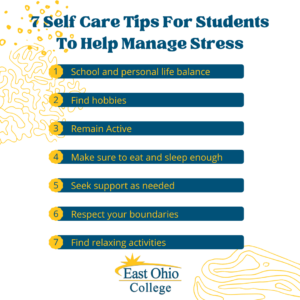Finishing your post-secondary education can be a challenging journey for anyone. Throughout that journey, you will, unfortunately, quite commonly encounter various stressors. It’s unrealistic to expect a stress-free life altogether. Fortunately, East Ohio College offers 7 valuable self-care tips to help you manage your stress.
1.) Create A Balance Between Your Personal Life And School Life
The first thing you must do is balance your personal and school life. Focusing too much on one aspect of your life can lead to an unnecessary increase in stress. In fact, we have an entire blog dedicated to helping you balance your personal life with your school life.

2.) Find Hobbies
In high-stress moments, it may feel like you have to focus solely on the task at hand. However, this is not always the most effective approach. Taking a brief pause to engage in one of your hobbies, or even exploring a new one, can serve as a fantastic stress reliever. This small break provides enjoyment and temporarily shifts your focus away from the source of stress.
Nonetheless, it is crucial to avoid becoming so engrossed in your hobby that you lose track of time completely. The task at hand, whether it’s homework, exam preparation, or something unrelated to academics, still needs your attention to be completed. To prevent time from slipping away unnoticed, consider setting a timer as a helpful reminder.
3.) Remain Active
Another tip we have is to remain active. This does not necessarily mean that you have to go to the gym, although you certainly can if that interests you, but you should try taking some walks. Exercise can reduce the effects of stress by increasing your endorphins, which can help improve your mood, according to the Mayo Clinic.
4.) Make Sure To Eat And Sleep Enough
One of our most emphasized tips underscores prioritizing adequate sleep and proper nutrition. According to WebMD, adults’ recommended amount of sleep typically falls between 7 and 9 hours per night, although some individuals may require up to 10 hours of sleep. Failing to attain sufficient sleep can render you susceptible to mood swings because of sleep deprivation.
In addition to sleep, ensuring you consume a proper amount of nourishing food is equally crucial. Balanced meals supply your body with essential nutrients and energy to navigate your daily tasks effectively. Low energy levels can significantly hinder your productivity, making it much more challenging to complete your tasks. Consequently, this can prolong the duration of stressful experiences.
5.) Seek Support As Needed
Feeling overwhelmed at times is completely normal, and seeking support is perfectly acceptable and highly encouraged. There are various avenues through which you can seek assistance. You might choose to arrange a session with a therapist or confide in a trusted friend or family member. Whichever path you decide, remember that it is entirely okay to reach out for help.
6.) Respect Your Boundaries
Another tip we cannot stress enough is the importance of setting clear and healthy boundaries. However, this doesn’t mean you can neglect your existing commitments. Instead, it means that it’s perfectly acceptable to decline when someone requests additional tasks or favors if it interferes with your current workload. Overloading your schedule can quickly become stressful, so recognizing your limits and politely declining when necessary is vital for maintaining balance and managing stress effectively.
7.) Find Relaxing Activities
Participating in relaxing activities can play a significant role in stress management. These calming activities effectively promote a sense of peacefulness and help prevent feeling overwhelmed. Additionally, they can serve as a brief break from stressors. Timers can be used as a precaution to avoid losing track of time. What can be considered relaxing can be somewhat subjective, but here are a few examples:
Meditation
Meditation is a great way to reduce stress. Meditation requires no special equipment, making it a quick and easy activity to get involved with. This makes it very accessible. With no special equipment, you can meditate anywhere and anytime whenever you feel stress rising. With continued meditation, you can learn to control your emotions better.
Music
In a Michigan State University study, music has been found to reduce stress, promote healing, and improve a person’s overall emotional well-being because music stimulates the production of dopamine. While helping with your health, music can be listened to while you get work done. Unlike meditation, you do not need to take a break to relieve stress, and you can listen to music while you work.
Yoga
The American Osteopathic Association lists that yoga’s most significant benefit is that it can improve a person’s overall well-being and aid in reducing stress. Yoga can also aid in developing coping skills. Better coping skills will help reduce the effects of stress in the future. In addition to the mental benefits of yoga, there are also many physical benefits, such as increased muscle flexibility and greater protection from injury.
Continue Your Education At East Ohio College
Do you want to further your education? Are you interested in pursuing a career in Nursing, Clinical Medical Assistant, Medical Office Administration, Medical Coding, Dental Assisting, Cybersecurity, or Business Administration? If the answer is yes, contact East Ohio College’s admissions office by Requesting Information or calling 330-385-1070 today!
